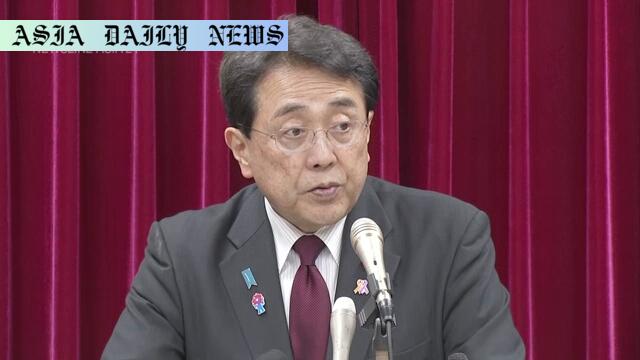Tariff Negotiations: Japan’s top trade negotiator, Economic Revitalization Minister Akazawa Ryosei, heads to Washington for crucial talks.

Introduction: The Vital Dynamics of US-Japan Tariff Negotiations
Japan and the United States, as two of the world’s leading economies, find themselves at a delicate point in their trade relationship, focused heavily on tariff negotiations. Economic Revitalization Minister Akazawa Ryosei, representing Japan as a top negotiator, is making a decisive move to Washington in pursuit of solutions that benefit both nations. The upcoming round of discussions carries high stakes for sectors such as automotive, agricultural goods, and imported products. Given the global scale of this dialogue, the outcomes are important not only to the two nations but could also impact global trade practices and market stability.
Akazawa’s statement on ensuring Japan’s national interest signals resolve and vigilance in protecting industries like automotive production, which are global leaders in efficiency and technology. These talks could potentially increase economic cooperation, but the intricacies of negotiations must consider the broader implications for both markets.
Japan’s Strategy: Focus on Key Proposals
The Japanese delegation has strategically prepared proposals designed to alleviate tensions in key areas. This includes increased imports of soybeans and corn—products vital to U.S. agriculture. In addition, Japan has unveiled plans to simplify the import of U.S. cars by revisiting procedural policies. This gesture is intended to demonstrate goodwill and commitment to advancing trade relationships.
Conversely, Japan is seeking the reduction or abolishment of tariffs levied on its auto industry, as these barriers have long been a source of contention. Tokyo’s plea is to establish terms that allow Japan’s automotive sector to remain competitive in U.S. markets. Furthermore, Washington has raised concerns about non-tariff barriers in Japan, which may involve regulatory or bureaucratic hurdles. Navigating these complexities will require thoughtful concessions from both sides.
Challenges and the Road Ahead
While the optimism for a mutually beneficial agreement is evident, challenges remain significant. The U.S. negotiators have underscored long-standing concerns regarding Japan’s trade practices. Moreover, balancing domestic political considerations with the overarching goal of global trade cooperation remains a sensitive terrain for both leaderships.
The timetable for these discussions remains crucial. Both sides must work swiftly to deliver results that prevent escalating trade disagreements, especially against the backdrop of economic uncertainties seen globally. Success in these negotiations could set a precedent for handling trade barriers in an era where collaboration is pivotal for economic revitalization.
Conclusion: Potential Broader Impacts
The implications of such tariff negotiations extend beyond immediate economic gains or losses. A successful resolution could strengthen U.S.-Japan relations and foster a model for fair trade engagement that other nations might emulate. On the other hand, if unresolved, these barriers could lead to a strain on one of the world’s most important bilateral alliances.
Although complex and multi-faceted, these discussions reflect the broader theme of global trade in the 21st century: an increasingly interconnected landscape demanding cooperation and balanced solutions. For stakeholders across industries, the hope remains that this chapter in U.S.-Japan trade relations will pave the way for stability and sustainable economic growth.
Commentary
Significance of the US-Japan Tariff Talks
The ongoing tariff negotiations between Japan and the United States highlight a critical juncture in global trade relations. At a time when economic policies are rapidly evolving to address new challenges, these talks exemplify the necessity of collaboration. Japan’s proactive approach, led by Economic Revitalization Minister Akazawa Ryosei, underscores its commitment to resolving longstanding disputes while also ensuring its industries remain competitive in the global market.
What stands out in this negotiation is Japan’s strategy not just to seek reduced tariffs but also to reciprocate with offers, such as increasing imports of U.S.-produced soybeans and corn. These proposals signal Japan’s willingness to engage on equitable terms, which is vital in building trust with its trade partners. The United States, on the other hand, continues to push for a more level playing field by addressing non-tariff barriers, ensuring its products gain a fair opportunity in Japanese markets. The balancing act between defending domestic industries and fostering international trade cooperation is a testament to the complexities involved.
Global Implications of Success or Failure
Should these talks achieve success, the ripple effects could be felt across the globe. The U.S.-Japan bilateral trade agreement could set a benchmark for how countries negotiate intricate trade issues. This is particularly crucial as global trade systems face pressures from protectionism and economic nationalism. A mutually beneficial agreement here could offer a vision of larger collaborative efforts for resolving disputes, demonstrating the power of diplomacy in international commerce.
Conversely, a breakdown in these negotiations could exacerbate trade tensions and send negative signals to other trading partners. The automotive sector, in particular, stands to lose significantly given its interconnectivity and reliance on smooth trade ties. Thus, the outcomes of these discussions are closely watched, both nation-states and industries globally.
Concluding Thoughts
In conclusion, this series of negotiations offers an insightful case study in global economics. It reminds us that while national interests drive policy decisions, international collaboration is non-negotiable in an interconnected world. Leaders on both sides must seize this opportunity to break barriers and foster a framework of trust, shared values, and long-term economic partnerships.


